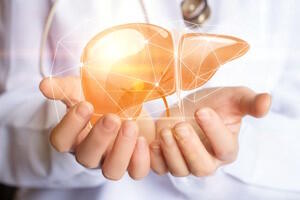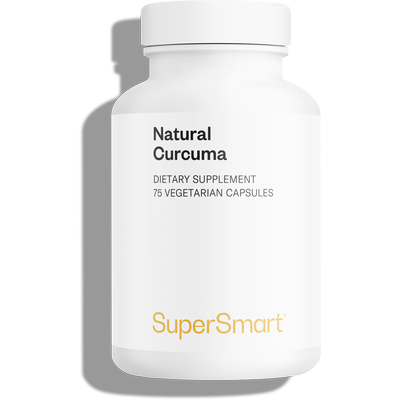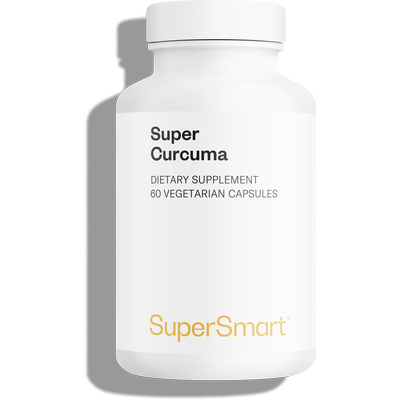28-06-2019
The liver: the hepatoprotective effects of curcumin
 You’re no doubt familiar with the health benefits of turmeric. In addition to being a cooking ingredient, the plant Curcuma longa L. is widely used in phytotherapy – and with good cause, since it contains a powerful active principle called curcumin. Scientists believe this substance has remarkable therapeutic benefits including anti-inflammatory activity, an anti-cancer effect and significant antioxidant potency. A recent study in which researchers investigated curcumin’s role in liver health suggests that hepatoprotective effects should now be added to this range of benefits1. We explore their findings below.
You’re no doubt familiar with the health benefits of turmeric. In addition to being a cooking ingredient, the plant Curcuma longa L. is widely used in phytotherapy – and with good cause, since it contains a powerful active principle called curcumin. Scientists believe this substance has remarkable therapeutic benefits including anti-inflammatory activity, an anti-cancer effect and significant antioxidant potency. A recent study in which researchers investigated curcumin’s role in liver health suggests that hepatoprotective effects should now be added to this range of benefits1. We explore their findings below.
Curcumin for combatting non-alcoholic fatty liver disease
Elevated risk of non-alcoholic fatty liver disease (NAFLD)
Given its natural antioxidant power, curcumin has attracted scientific interest for its potential to protect the liver against certain diseases such as or NAFLD (non-alcoholic hepatic steatosis). Characterised by a build-up of fat in liver cells, this is a common disease, with an estimated prevalence of 15%-30% among Western populations, and 50%-90% among obese individuals. Accumulation of fat in the body is a significant risk factor. Diabetics are more likely to develop NAFLD with a risk of more than 70%. Like excess fat, insulin resistance may be involved in the first stages of liver disease. Benefits of curcumin for liver health
While obesity and diabetes significantly increase the risk of developing NAFLD, there are other factors affecting liver function such as free radicals induced by oxidative stress, lipid peroxidation, inflammatory response and hepatic fibrosis. A number of natural molecules are attracting scientific interest for their potential in combatting these processes and protecting liver health. One such substance is curcumin which is already recognised for its antioxidant properties, anti-inflammatory activity and cholesterol-lowering effects.
Hepatoprotective effects of curcumin supplementation
Evaluation of the effects of curcumin supplementation
With its many health benefits, curcumin is believed to offer significant potential for preventing and treating NAFLD. The therapeutic benefits of this powerful natural antioxidant were actually confirmed by a recent study published in the journal Drug Research1, in which scientists evaluated the effects of curcumin supplementation in NAFLD patients. Subjects were divided into two groups: 52 patients were given a placebo, while a further 50 were supplemented with 1000mg of curcumin a day.
Protective and beneficial effects for the liver
After eight weeks’ supplementation, the researchers observed positive results in the supplemented group. The condition of their livers had improved with significant decreases in fat levels. They also noted a reduction in pathogenic markers such as levels of aspartate aminotransferase and alanine aminotransferase. Compared with the control group, the curcumin-supplemented patients had also lost weight and reduced their waist circumference.
With its protective action, anti-inflammatory activity and positive effects on the lipid profile, curcumin would seem to offer significant benefits for liver health. The many benefits of this powerful natural antioxidant have for some years been available in the form of nutritional supplements.
> Source :
1. Yunes Panai et al., Efficacy and Safety of Phytosomal Curcumin in Non-Alcoholic Fatty Liver Disease: A Randomized Controlled Trial, Drug Res (Stuttg) 2017; 67(04): 244-251.
Order the nutrients mentioned in this article
Further reading
24-06-2019
Better known as PEA, palmitoylethanolamide is a natural and powerful active principle discovered in 1957. Since then, it has consistently been the subject of new...
Read more28-08-2019
Though many people are not aware of choline, it is actually recognised as an essential nutrient by the prestigious US National Academy of Medicine 1...
Read more01-08-2018
Inflammation – whether unseen or painful – has always been at the root of a variety of incapacitating ‘diseases of civilisation’, such as cardiovascular disease,...
Read more© 1997-2025 Fondation pour le Libre Choix
All rights reserved
All rights reserved
Free
Thank you for visiting our site. Before you go
REGISTER WITHClub SuperSmart
And take advantage
of exclusive benefits:
of exclusive benefits:
- Free: our weekly science-based newsletter "Nutranews"
- Special offers for club members only



















